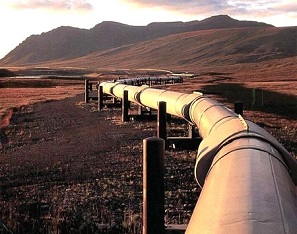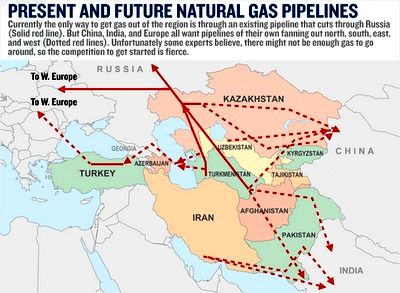TAPI deals nudge pipeline nearer reality
Robert M. Cutler

Negotiations this month have opened the way to conclusion of a Gas Sales Price Agreement for the Turkmenistan-Afghanistan-Pakistan-India (TAPI) natural gas pipeline, despite a number of obstacles still remaining.
On August 18, a Turkmenistan-Afghanistan meeting at the level of technical experts from the two countries' competent ministries reached agreement on a number of implementation and construction issues, also including their economic provisions, according to reports by the State News Agency of Turkmenistan.
Agreement has also been reached bilaterally between Turkmenistan and India over the price of the former's natural gas to the latter. India had proposed a price of US$460 per thousand cubic meters (tcm) to Ashgabat, which had counter-offered $505-$525/tcm. New Delhi did not want to pay a price making TAPI gas more expensive than the liquefied natural gas (LNG) that it already imports, mainly from Qatar. Natural gas represents only 6% of India's total energy consumption, and the country is keen to increase that proportion.
The four countries signed in Ashgabat last December 11 an intergovernmental agreement that was complemented by a framework document approved by the respective energy ministers. According to Turkmenistani sources, it confirmed that the 1,735-kilometer pipeline would be built in Afghanistan alongside the road from Herat to Kandahar (and at least partly underground to deter terrorist attacks), then routed by way of Quetta and Multan in Pakistan to reach the Indian border town of Fazilka.
The pipeline would carry 33 billion cubic meters per year (bcm/y) of gas, and the approximately $7.6 billion cost would be one-third financed by the Asian Development Bank (ADB), which is willing to provide a large part of Pakistan's equity in the project. The country desperately need to import energy to satisfy growing domestic demand.
The framework document foresaw that Turkmenistan would hold three bilateral meetings with each of the other participating states to discuss prices, transit tariffs and other supply conditions. Following those consultations, another joint meeting of the four was planned to coordinate all the sales and purchase contracts and sign them together.
The bilateralism of the preliminary consultations has given a certain advantage to Turkmenistan. Afghanistan, India, and Pakistan had continually sought a uniform price deal from Turkmenistan, which wanted to negotiate individually with each of the other three. Pakistan in particular asserted it would cause political problems for Islamabad if there were different prices for different countries.
Now that Turkmenistan and India have reached a bilateral agreement, unnamed top officials in Pakistan have told the Islamabad news agency The News that "it seems Turkmenistan is not inclined [to sell] gas to Pakistan at the same price at which it is selling to India", so they have informed Turkmenistan "Pakistan will match the lowest gas price between the seller and buyer country". Bilateral talks scheduled earlier this week in Ashgabat have been postponed for a month.

There is still wiggle room, as Turkmenistan has announced that it will have to build a plant to take sulfur out the gas that it produces before the gas enters the pipeline (otherwise corrosion becomes a greater risk over the longer term), and that as a result the prices to all parties will be increased.
It was originally thought that the gas for TAPI would come from Turkmenistan's Dauletabad deposit, but last year Ashgabat informed its partners that gas would instead come from the newer South Yolotan-Osman field that is already also supplying gas to China. This facilitates an eventual decision for Turkmenistan to participate in the planned Nabucco natural gas pipeline (from Azerbaijan through Turkey to southeast and central Europe), because it frees up product from Dauletabad in Turkmenistan's southeast to transit the 900-kilometer domestic East-West Pipeline (EWP) that Ashgabat is now rebuilding and which ends close to the country's Caspian Sea coastline.
The EWP, projected to carry a volume of 30 bcm/y, could be connected up to an eventual undersea Trans-Caspian Gas Pipeline (TCGP). Good progress has been made over the past two years in TCGP negotiations with Azerbaijan, particularly since Turkmenistan's President Gurbanguly Berdimuhamedow declared last December in Baku that he did not think permission for its construction was required from any other Caspian Sea littoral states. The TCGP would in turn contribute to Nabucco's volumes.
Separately from the TAPI project, Turkmenistan has built a gas processing plant on its Caspian Sea coastline to handle 5-10 bcm/y from an offshore block that has been developed by the Malaysian firm Petronas. Turkmenistan's state media reported early last week that this gas will soon be exported, although it has not specified the route.
Candidates include the Azerbaijan-Georgia-Romania Interconnector (AGRI) project across the Black Sea for LNG and a separate compressed natural gas (CNG) project across the Black Sea to Bulgaria, in addition to the eventual Nabucco pipeline.
(Copyright 2011 Asia Times Online (Holdings) Ltd. All rights reserved. Please contact us about sales, syndication and republishing.)
___________________________________________________________________________________
Dr Robert M Cutler (http://www.robertcutler.org), educated at the Massachusetts Institute of Technology and The University of Michigan, has researched and taught at universities in the United States, Canada, France, Switzerland, and Russia. Now senior research fellow in the Institute of European, Russian and Eurasian Studies, Carleton University, Canada, he also consults privately in a variety of fields.
___________________________________________________________________________________
Published here: http://www.atimes.com/atimes/Central_Asia/MH19Ag02.html
URL: http://www.a-w-i-p.com/index.php/2011/08/23/tapi-deals-nudge-pipeline-nearer-reality
























